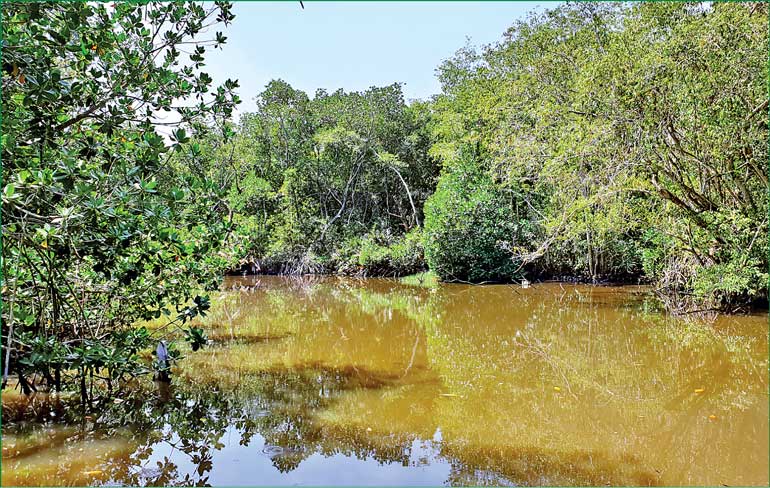Saturday Feb 28, 2026
Saturday Feb 28, 2026
Saturday, 25 September 2021 00:05 - - {{hitsCtrl.values.hits}}

Mangroves are beneficial for biodiversity, the environment, the climate, and human communities – Pic courtesy SLYCAN Trust
 At the border of land and sea, only a special kind of forest can survive and thrive. Mangroves are able to withstand the harsh conditions of this liminal area, including salt water, unsteady grounds, changing tides, waves, and storms. They have adapted to this environment in unique ways, creating habitats for many species of plants and animals, providing powerful ecosystem services, and capturing “blue carbon”. In short, mangroves are beneficial for biodiversity, the environment, the climate, and human communities.
At the border of land and sea, only a special kind of forest can survive and thrive. Mangroves are able to withstand the harsh conditions of this liminal area, including salt water, unsteady grounds, changing tides, waves, and storms. They have adapted to this environment in unique ways, creating habitats for many species of plants and animals, providing powerful ecosystem services, and capturing “blue carbon”. In short, mangroves are beneficial for biodiversity, the environment, the climate, and human communities.
Despite their many advantages, mangroves have been destroyed and degraded for decades. More than a million hectares of mangroves have been lost world-wide since 1996, equalling a loss rate of approximately 0.21% per year. In Sri Lanka, mangrove ecosystems along the island’s coastline have been cut down for prawn farms, salterns, and other development activities in the past. To reverse this mangrove loss, government authorities as well as other actors are trying to restore mangrove areas and protect them through policies, laws, regulations, awareness creation, capacity-building, and on-the-ground action.
Like any forest, mangrove ecosystems are capable of growing and spreading on their own. Given enough time and the absence of disturbances, mangroves and their associates can spread into suitable areas and expand without external support. However, there are three key issues complicating this process, all of which are contained within the previous sentence: “enough time,” “absence of disturbances,” and “suitable areas.”
Due to sea level rise and the rapid climatic changes caused by global warming, mangroves might not have sufficient time to adapt without help. Especially in areas where they cannot migrate landwards, sea level rise presents a real danger. While mangroves protect the coastline against erosion and storm surges, they are themselves vulnerable if the sea level rises and extreme events become more frequent and intense.
While they are growing, mangroves are sensitive to disruptions, such as grazing livestock, other animals, pollution and waste influx, changes in salinity, periods of dryness and water scarcity, storms, or wildfires. Additionally, not all areas in Sri Lanka’s coastal region are suitable for mangroves to grow. In theory, every area that previously had mangroves could qualify as a natural habitat: wherever mangroves have been cut down, they should be able to grow back if given the chance. However, in many cases, the conversion of land use to prawn farms or salterns has permanently altered the hydrology, soil composition, and salinity of the area. In these cases, human assistance is required to render the land suitable again and ensure that mangroves can grow and proliferate.
Therefore, assisted natural growth, rehabilitation, conservation, gap filling, and establishing sustainable systems of monitoring and after-planting care are just as important as planting seedlings. If planting efforts are to be conducted, it is critical to select a suitable area, understand the risk factors, and select the right species, the right time, and the right planting method.
Mangroves can be great allies in the struggle against climate change, protect the coastline, and provide livelihoods for communities. To protect, conserve, or restore them, it is vital to work with local authorities and communities, build capacities and awareness, and engage all relevant stakeholders in a given area. If the success of mangrove planting can be connected to the success of com munity livelihoods, such as ecotourism, boat tours, or mangrove-based products, it creates a strong incentive for local communities to engage and invest in mangrove conservation.
(The writer works as Director – Research & Knowledge Management at SLYCAN Trust, a non-profit think tank based in Sri Lanka. His work focuses on climate change, adaptation, resilience, ecosystem conservation, just transition, human mobility, and a range of related issues. He holds a Master’s degree in Education from the University of Cologne, Germany and is a regular writer to several international and local media outlets.)